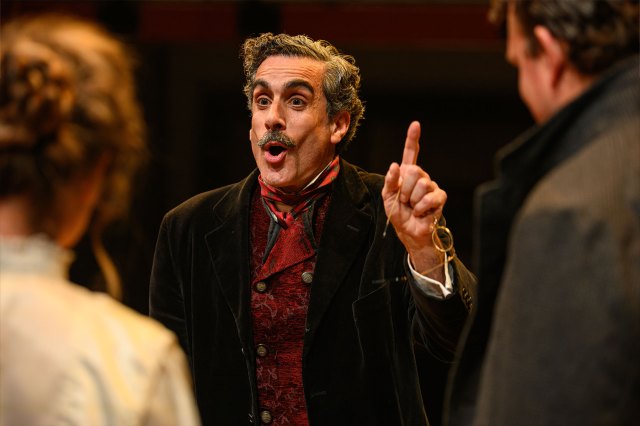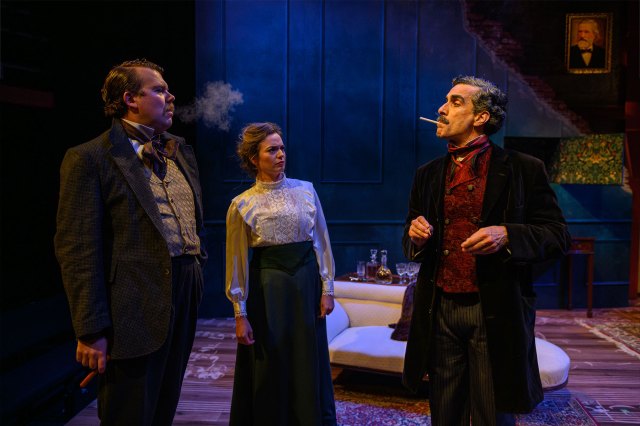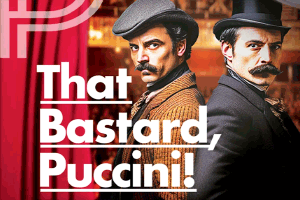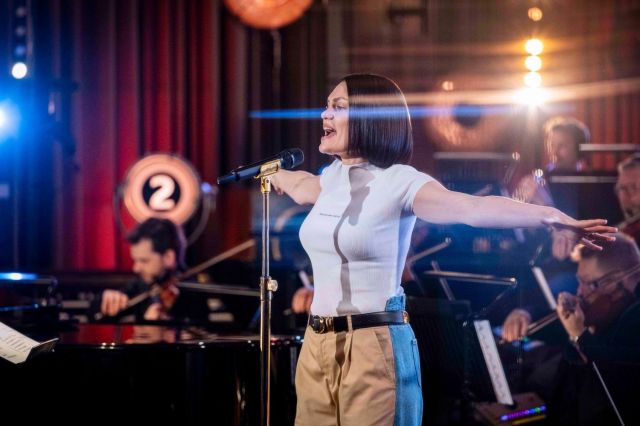That Bastard, Puccini! at the Park Theatre – review
James Inverne’s comedy runs until 9 August

Don’t be fooled by the exclamatory, slightly racy title; James Inverne’s That Bastard, Puccini! is a gentle affair, a merry comedy with overtones of rarified high culture, inspired by genuinely fascinating historical facts. It’s an uneven but enjoyable amalgam of vaudevillian humour, soap opera and actual opera, that gets better and better as it trundles along.
The rivalry between Italian composers Giacomo Puccini and Ruggero Leoncavallo as they each attempt to create an opera based on Henri Murger’s Scènes de la Vie de Bohème is particularly interesting when looked at with hindsight. Inverne does just that, having the two composers (played by Sebastien Torkia and Alasdair Buchan respectively) occupying a sort of liminal space whereby they each give their own heavily biased points of view on this story of creative one-upmanship, artistic and social showboating and, occasionally, personal despair. They comment, often wittily, on their shared history, but also on the way their work and legacies have been perceived in the years since.
Puccini’s La Bohème is, of course, a beloved staple on international opera stages, but the Leoncavallo version was the bigger success, in fact, when they originally premiered. It now pretty much languishes in obscurity and the only Leoncavallo work to maintain a place in the regularly performed operatic canon is Pagliacci, a detail touched on in the text.
Inverne’s script, jokey but intelligent, is alive to the irony of the ultimate fate of the duelling works. It depicts Buchan’s hearty but angsty (and very likeable) Ruggero, fretting over being perceived as a one-hit wonder, as his wife, singer Berthe (Lisa-Anne Wood), cajoles then chides him, while Torkia’s smug but not unsympathetic Puccini sails towards deification.

The juxtaposition of Mischief-style comedy business (actors swap roles by adopting funny accents and making minor costume adjustments) and the more poignant, urgent examination of the pain often engendered by artistic endeavour results in an uncertainty of tone. It’s mildly funny, but never flat-out hilarious, and certainly interesting (particularly if you’re an opera buff), but never truly riveting. Leoncavallo as a character gets a generous helping of backstory, but the other multiple characters, including Puccini’s wronged wife and a comically vowel-mangling Gustav Holst, are little more than sketches.
That’s unfortunately also true of this representation of Puccini himself, and of Berthe. Torkia captures the requisite pomposity and beady-eyed self-interest of the successful composer but lacks a certain gravitas, although that may develop as the run continues. Wood invests the underwritten Berthe with a glowing sensuality and nicely spiky energy, but really comes into her own when required to sing. The production includes brief excerpts from the operas, particularly Leoncavallo, and a major pleasure of the evening is hearing Wood’s soaring, bell-like soprano at such close quarters.
Like the piece itself, Daniel Slater’s well-paced, playful staging can’t seem to decide if it’s celebrating the extravagant, high-stakes milieu of the late 19th-century opera world or sending it up. It’s lovely to look at though, with Carly Brownbridge’s gorgeous-on-a-budget set evoking the opulence of grand salons and opera houses while acknowledging the bare brick that is such a distinctive part of the Park Theatre’s ambience.
As written here, both composers subscribe to the notion that “art comes first” and, despite the tonal inconsistencies, Inverne makes that point convincingly. The play ends on a surprisingly sweet note that, while not exactly moving, certainly leaves you with a smile on your face. It’s a pleasant couple of hours in the theatre.
















